SSOP Overhaul Saves Juice Maker a Bundle in Sanitation Costs

Ecolab prides itself on helping customers save money. The company doesn’t do that by selling them cheaper chemicals, says Jeff Tolke, Senior Marketing Manager for Food Processing. “Ecolab has identified literally millions in operational cost savings for our customers at dairy, beverage and food processing plants across the country.”
The St. Paul, MN-based global developer of premium cleaning, sanitizing and pest management products and services for the food industry accomplishes this by having experts, such as its SEALS Team (Service Excellence Application Leadership Support), work together with the sanitarians to make improvements in their cleaning processes, chemical and water usage, or distribution of man-hours, all of which saves them money.
Through its EcoShield program, Ecolab offers comprehensive, integrated intervention systems with thorough productivity services to provide food safety guidance and improved operational efficiencies,” Tolke says. “The expertise we bring to the table adds real value to the customer relationships.”
Improving Plant Sanitation
In one of its recent success stories, Ecolab helped save an apple juice and applesauce manufacturer in the Pacific Northwest hundreds of thousands of dollars in sanitation costs by working in collaboration with the plant. This teamwork reduced water waste and chemical overuse by changing the plant’s standard sanitation operating procedures (SSOPs). When Ecolab first started working with the company, Ecolab Account Manager Paul Brookes spent numerous days on-site, observing and recording the day-to-day operations. “I saw a lot of potential right away to reduce chemical use and inventory, to improve safety and to reduce costs and accidents,” he says.
After completing his review, Brookes made the following changes:
• He recommended a new process for cleaning the concentrator, and after collaborating on a revised approach, the plant cut an hour from the cleaning time and reduced the amount of chemicals used.
• After auditing every system and talking it through with the Operations team, he delivered feedback on how to improve efficiencies in several areas. The lube lines, for example, used flat brass hoses with no nozzles, resulting in an constant flow of chemicals. It was an inefficient and unnecessary overuse of chemicals. Brookes added sized nozzles and timers to the hoses, which now turn on and off automatically every few seconds, saving the company nearly $5,000 a year on lube chemicals.
• He also recommended Clean-in-Place (CIP) systems in the main areas of the plant, automating the cleaning of several large tanks, which reduced time and labor costs. He also added a centralized source of caustic cleaning solution in a reuse system that is now used to clean multiple tanks, saving the company roughly $10,000 per year.
• Brookes brought in an expert from the Ecolab SEALS Team to assess and improve the company’s water usage rates. After observing the cooling towers, pumps and documentation, Ecolab was able to make sound recommendations. Again, by working with the plant’s operations team to reach consensus and establish a common game plan, changes were made that saved millions of gallons of water each year through simple measures such as reducing the water flow to maintain the pump seals and reusing that water.
• He recommended SPECS, a proprietary master sanitation scheduling software program that automatically schedules what to clean, how to clean it and at what frequency to clean. It also tracks training, prints work orders and reports and offers training and cleaning guidance at the touch of a button, which improves efficiencies and helps the facility stay on top of all cleaning and maintenance requirements.
The resulting savings from his initial changes were approximately over $100,000 and that doesn’t include savings related to improved quality and efficiency. “When there are production holds cash flow stops,” he says, “these quality improvements prevent that from happening.”
To further help the company improve its efficiencies, he expects to install Ecolab’s Quadexx system at the site this year. The Quadexx system formulates and allocates up to 250 different cleaning chemicals. When a sanitarian needs a particular chemical, he or she types the name and quantity into the Quadexx control panel, which then automatically mixes and dispenses exactly the amount of finished product required into an enclosed container. Accidental spillage during handling is greatly reduced, waste due to misuse or throwing away leftover chemicals is reduced, and the opportunity for errors in mixing is virtually eliminated.
This is just one of hundreds of Ecolab success stories. It’s the goal of Ecolab account managers to find and eliminate inefficiencies for maximum quality and profitability, Tolke says. “Bringing in a fresh set of eyes can make all the difference.”
Whether it’s changing the sanitation chemicals used by a dairy facility to increase shelf life of the product, or altering the cleaning process at a poultry processor to reduce the number of man-hours it takes to complete, Ecolab customers almost always save the money by making their SSOPs more efficient. Says Tolke, “Ecolab has the tools and the expertise at hand to help customers make better choices.”
www.ecolab.com
Looking for a reprint of this article?
From high-res PDFs to custom plaques, order your copy today!





